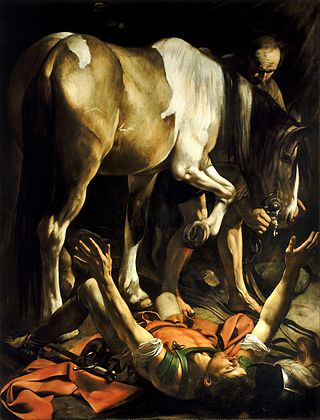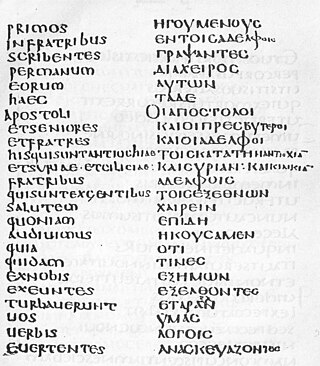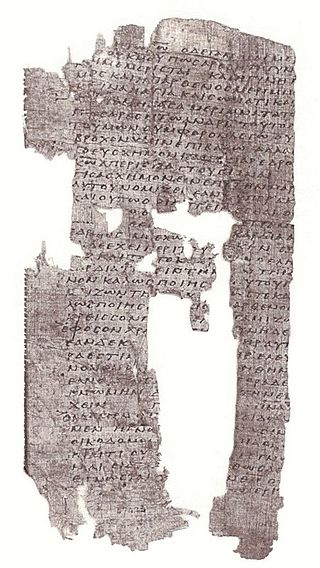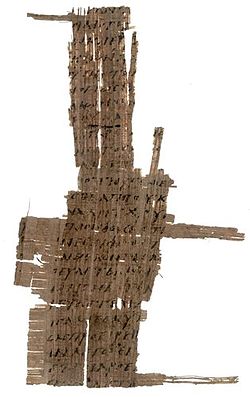
The Epistle to the Galatians is the ninth book of the New Testament. It is a letter from Paul the Apostle to a number of Early Christian communities in Galatia. Scholars have suggested that this is either the Roman province of Galatia in southern Anatolia, or a large region defined by Galatians, an ethnic group of Celtic people in central Anatolia.

James the Just, or a variation of James, brother of the Lord, was "a brother of Jesus", according to the New Testament. He was an early leader of the Jerusalem Church of the Apostolic Age. Traditionally, it is believed he was martyred in AD 62 or 69 by being stoned to death by the Pharisees on order of High Priest Ananus ben Ananus.

The Judaizers were a faction of the Jewish Christians, both of Jewish and non-Jewish origins, who regarded the Levitical laws of the Old Testament as still binding on all Christians. They tried to enforce Jewish circumcision upon the Gentile converts to early Christianity and were strenuously opposed and criticized for their behavior by the Apostle Paul, who employed many of his epistles to refute their doctrinal positions.
The incident at Antioch was an Apostolic Age dispute between the apostles Paul and Peter which occurred in the city of Antioch around the middle of the first century. The primary source for the incident is Paul's Epistle to the Galatians 2:11–14. Since the 19th century figure Ferdinand Christian Baur, biblical scholars have found evidence of conflict among the leaders of early Christianity; for example, James D. G. Dunn proposes that Peter was a "bridge-man" between the opposing views of Paul and James, brother of Jesus. The final outcome of the incident remains uncertain, resulting in several Christian views on the Old Covenant.

Paul the Apostle has been placed within Second Temple Judaism by recent scholarship since the 1970s. A main point of departure with older scholarship is the understanding of Second Temple Judaism; the covenant with God and the role of works as a means to either gain or keep the covenant.

Acts 15 is the fifteenth chapter of the Acts of the Apostles in the New Testament of the Christian Bible. It records Paul and Barnabas traveling to Jerusalem to attend the Council of Jerusalem and the beginning of Paul's second missionary journey. The book containing this chapter is anonymous but early Christian tradition uniformly affirmed that Luke composed this book as well as the Gospel of Luke.

Acts 9 is the ninth chapter of the Acts of the Apostles in the New Testament of the Christian Bible. It records Saul's conversion and the works of Saint Peter. The book containing this chapter is anonymous but early Christian tradition uniformly affirmed that Luke composed this book as well as the Gospel of Luke.

Acts 11 is the eleventh chapter of the Acts of the Apostles in the New Testament of the Christian Bible. It records that Saint Peter defends his visit to Cornelius in Caesarea and retells his vision prior to the meeting as well as the pouring of Holy Spirit during the meeting. The book containing this chapter is anonymous but early Christian tradition uniformly affirmed that Luke composed this book as well as the Gospel of Luke.

Acts 13 is the thirteenth chapter of the Acts of the Apostles in the New Testament of the Christian Bible. It records the first missionary journey of Paul and Barnabas to Cyprus and Pisidia. The book containing this chapter is anonymous but early Christian tradition uniformly affirmed that Luke composed this book as well as the Gospel of Luke.

1 Corinthians 9 is the ninth chapter of the First Epistle to the Corinthians in the New Testament of the Christian Bible. It is authored by Paul the Apostle and Sosthenes in Ephesus. Paul defends himself as an apostle.

Galatians 1 is the first chapter of the Epistle to the Galatians in the New Testament of the Christian Bible. It is authored by Paul the Apostle for the churches in Galatia, written between 49 and 58 AD. This chapter contains Paul's significant exposition concerning the significance of God's revelation of Jesus Christ.

Galatians 3 is the third chapter of the Epistle to the Galatians in the New Testament of the Christian Bible. It is authored by Paul the Apostle for the churches in Galatia, written between 49–58 CE. This chapter contains Paul's important argument about Abraham's faith and his 'offspring', a designation for "those belong to Jesus Christ".

Galatians 4 is the fourth chapter of the Epistle to the Galatians in the New Testament of the Christian Bible. It is authored by Paul the Apostle for the churches in Galatia, written between 49 and 58 CE. This chapter contains one of Paul's richest statements in Christology.

Galatians 5 is the fifth chapter of the Epistle to the Galatians in the New Testament of the Christian Bible. It is authored by Paul the Apostle for the churches in Galatia, written between AD 49–58. This chapter contains a discussion about circumcision and the allegory of the "Fruit of the Holy Spirit".

Galatians 6 is the sixth chapter of the Epistle to the Galatians in the New Testament of the Christian Bible. It is authored by Paul the Apostle for the churches in Galatia, written between 49–58 CE. This chapter contains Paul's exhortations and also a summary of the key points in the epistle.

Colossians 4 is the fourth chapter of the Epistle to the Colossians in the New Testament of the Christian Bible. Traditionally, it is believed to have been written for the churches in Colossae and Laodicea by Apostle Paul, with Timothy as his co-author, while he was in prison in Ephesus, although there are debatable claims that it is the work of a secondary imitator, or that it was written in Rome. This chapter contains the final exhortations and greetings.

1 Thessalonians 1 is the first chapter of the First Epistle to the Thessalonians in the New Testament of the Christian Bible. It is authored by Paul the Apostle, likely written in Corinth in about 50-51 AD for the church in Thessalonica. This chapter contains the prescript and Paul's thanksgiving for the church.

1 Thessalonians 5 is the fifth chapter of the First Epistle to the Thessalonians in the New Testament of the Christian Bible. It is authored by Paul the Apostle, likely written in Corinth in about 50-51 CE for the church in Thessalonica. This chapter contains a message about Christ's second coming, and various final exhortations and greetings.

2 Timothy 1 is the first chapter of the Second Epistle to Timothy in the New Testament of the Christian Bible. The letter is traditionally attributed to Paul the Apostle, the last one written in Rome before his death, addressed to Timothy. Some scholars argue that it is the work of an anonymous follower, after Paul's death in the first century AD. This chapter contains an opening greeting, a personal story of Paul and Timothy, and a description of the opponents they are facing.

James 2 is the second chapter of the Epistle of James in the New Testament of the Christian Bible. The author identifies himself as "James, a servant of God and of the Lord Jesus Christ" and the epistle is traditionally attributed to James the brother of Jesus, written in Jerusalem between 48 and 61 CE. Alternatively, some scholars argue that it is a pseudographical work written after 61 CE. This chapter contains an exposition about the commandment, "You shall love your neighbour as yourself", and about dead faith.














